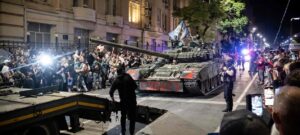
The Failed Prigozhin Uprising Over the weekend, events in Russia took a dramatic turn: Fighters from the Wagner Group set off from Ukraine towards Moscow, only to be suddenly called back by their leader. What happened? An overview.
The outward signs of the uprising are likely to be quickly eradicated: hastily erected roadblocks on the southern exits of Moscow, roads damaged by tanks in Rostov-on-Don, houses hit by gunfire in Voronezh, trenches on the M4 highway to stop armored columns.
Politically, however, things look different: An old ally of President Vladimir Putin dared to launch an – apparently unexpected – armed uprising and negotiated a way out that is likely to further tarnish Putin’s reputation.
On Friday, Yevgeny Prigozhin, after months of verbal insults, took action against the Russian Defense Minister and the Chief of the General Staff, calling them incompetent, corrupt, fraudulent, and bureaucratic. And then came the outrageous accusation: “They launched missile attacks on our rear base. A large number of our fighters have died,” said Prigozhin.
Putin threatened Prigozhin with penalties.
Prigozhin set his troops in motion in the Ukraine-Russia border area, occupied a headquarters of the Russian army in Rostov-on-Don, and then his well-equipped columns moved north – towards Moscow.
“Anyone who consciously chooses the path of betrayal, prepares for an armed mutiny, and pursues the path of blackmail and terrorist methods will inevitably face punishment,” warned President Putin on Saturday in a televised address to his long-time confidant Prigozhin. “He will be held accountable both under the law and before our people.”
Lukashenko apparently mediated a deal
Negotiations were already underway – according to the official account, Belarusian leader Alexander Lukashenko, with Putin’s explicit approval, contacted his long-time friend Prigozhin and negotiated terms for an end without a major bloodshed. However, there were casualties – the Wagner troops allegedly shot down an airplane and several helicopters.
Nevertheless, the spokesperson for the Russian president, Dmitry Peskov, announced, “It has been agreed that the Wagner group will return to their camps, and some of them, if they wish, will sign contracts with the Ministry of Defense in the future.” And Yevgeny Prigozhin? He was also granted immunity; he can leave for Belarus without being disturbed and on Saturday evening, amidst applause from those present, he left the army headquarters in Rostov-on-Don.
“We embarked on a march for justice,” explained Prigozhin. “Within a day, we were 200 kilometers away from Moscow. During that time, we did not shed a single drop of our fighters’ blood.”
No further statements from Prigozhin and Putin
Since then, Prigozhin has not made any public statements, and Russia’s president has remained silent as well. Although an interview recorded by state television before the uprising was broadcast on Sunday, Putin logically could not address the weekend’s events.
The Defense Minister, Sergei Shoigu, and his Chief of the General Staff, who were insulted by Prigozhin, have also gone into hiding for now. However, the Ministry of Defense has now released a video of Shoigu, showing him in a military headquarters in Ukraine. It is unclear whether the video was recorded recently, after the Wagner uprising. According to the Kremlin spokesperson, the dismissal of the minister and the chief of the general staff was not part of the agreement with Prigozhin.
How did the armed uprising come about? What are the consequences for the Putin system? How much has the image of being a guarantor of security and stability in the country been tarnished? And will